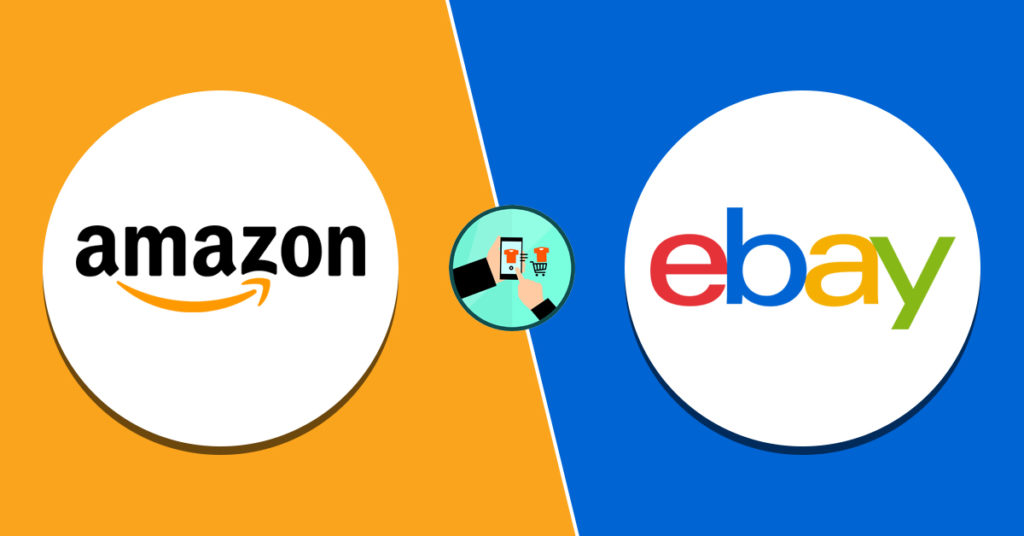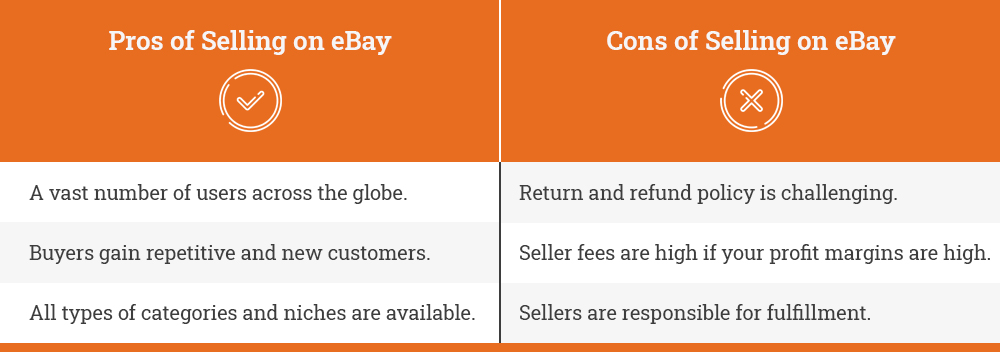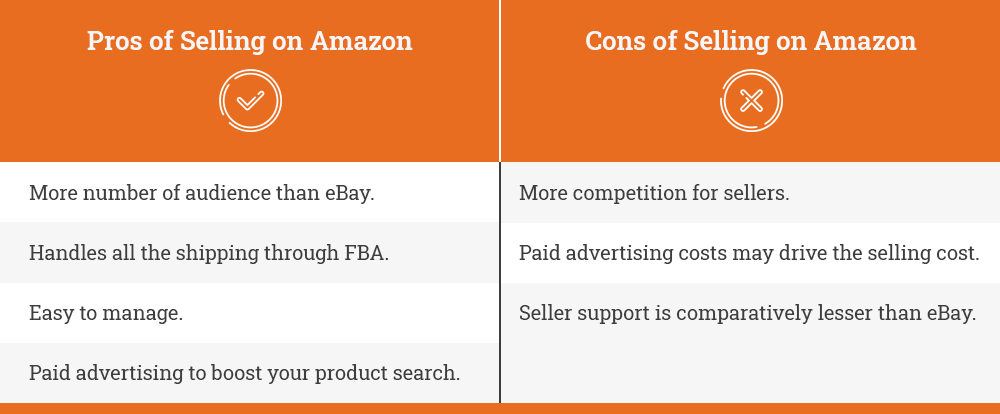
According to a Forbes report, shoppers are expected to spend $4.2 trillion shopping online in 2021. This sudden surge in online shopping started after the 2020 pandemic and has reformed shopping behavior significantly.
This incredible change has drifted various sellers towards online selling. When it comes to online stores- Amazon and eBay are the two platforms that hit the majority of individual’s minds. In order to decide on one platform, sellers need to be aware of the essential factors like seller fees, fulfillment methods, product categories, advertising options, etc. before jumping to a conclusion. After all, your money matters and it should be invested in a worthy place. But the process doesn’t end here, promoting your marketplace through robust SEO services is equally important to skyrocket your business.
Are you planning to start an eCommerce business and not sure which platform will comply with your requirements? You have landed at the right place. In this blog, we will first discuss Amazon and eBay in brief and then head towards the Amazon vs eBay comparison and factors that you should consider while making your choice. Further, we will illustrate the pros and cons of selling on eBay and Amazon.
Amazon: An eCommerce Giant
Amazon is an online commercial center that permits outsider merchants to sell their items. This site sells more than 12 million items all alone, with Amazon commercial center dealers carrying the stupendous total to in excess of 353 million items.
With Amazon, the emphasis is on changes. Amazon doesn’t zero in on dealers and assisting merchants with acquiring transformations. Their emphasis is on advancing vendors with items that individuals are destined to purchase.
This can appear to be baffling as an outsider merchant since it doesn’t ensure you’ll procure transformations. You should enhance your item postings, acquire audits, and make a positive client experience.
Amazon pins contenders against each other. With examination shopping choices, clients can think about items and pick which item is best for them. It makes Amazon an incredibly cutthroat market.
Purchasers and vendors approach some one-of-a-kind highlights through Amazon’s foundation. For purchasers, there is the Amazon Prime program. For a yearly expense, Amazon clients gain admittance to free and quick delivery each time they make a buy.
With respect to vendors, it costs $39.99 each month to sell items on Amazon’s site, in addition to extra merchant expenses. Furthermore, vendors gain admittance to Fulfillment by Amazon (FBA). This program permits merchants to sell their items on Amazon’s site without stressing over shipping and transportation.
eBay: The Competitor-Driven Marketplace
eBay’s foundation works somewhat better contrasted with Amazon. This stage is based on an offering framework. While there is as yet the choice to purchase items, by and large, numerous individuals utilize the most noteworthy offering framework to make a cutthroat commercial center.
This offering framework permits vendors to post items that are old, new, exceptional, or elusive. It takes into consideration a variety of items for the individuals who peruse on the site.
eBay makes it simple for vendors to highlight their image in the eBay store. There’s more space for customization and making your store stand apart from the opposition.
On the off chance that you decide to sell on eBay, you should be set up to deliver and satisfy all items all alone. eBay doesn’t offer any uncommon program to dispatch your items for you. This implies you should do it in-house or recruit an outsider.
At the point when you sell your items on the web, there is an additional charge you should pay per posting. Like Amazon, there are likewise vendor expenses once you make a deal.
Factors To Consider While Selecting Amazon or eBay For Your Online Business
Are you new to the eCommerce business? Here we have discussed some factors for Amazon vs eBay marketplace in detail to help you choose the right one to sell your products:
Factor #1: Amazon vs eBay : Fulfillment Methods
Amazon
FBA (Fulfillment By Amazon) is a huge benefit as it increased sales by 30% to 50%. Third-party sellers can also leverage it by enrolling themselves. Under this feature, Amazon stores your products and also fulfills your orders. Not only does it simplify the whole product management process but provides customer service for retailers and various other benefits like eligibility for Super Saver Shipping and Amazon Prime. As a result, Amazon makes it easier for sellers to ship, pack and deliver products as it removes the hassle of the fulfillment process.
eBay
Currently, there are no dedicated shipping and fulfillment services for local sellers but it does provide a Global Shipping Program. Basically, if you are in Chicago and the sellers are from Chicago too, then you have to fulfill every process- picking, packing, and shipping your own orders. This can prove to be challenging for new sellers, shipping, fulfillment without any support from eBay is expensive.
Factor #2: Amazon vs eBay : Seller Fees
From the selling point of view let us look, how Amazon vs eBay selling is different from one another
Amazon
Based on the sales volume, sellers are provided with two selling options from Amazon: Individual or Professional.
- If you are a new seller and confused about where to start, you can opt for an Individual plan. Under this plan, you get the benefit of selling up to 40 items/month too with zero monthly charges. However, you need to pay 99 cents for every item sold.
- Amazon charges $39.99 per month for the subscription of Professional Seller. What’s the benefit of a Professional Seller subscription? You get 100,000 free listings and other benefits if your products are constantly selling.
- It also takes a referral fee per item sold that varies for each product category. If you are selling media items, $1.80 will be charged as a closing fee. Amazon has lesser selling fees than eBay- making it more preferable for sellers.
eBay
eBay has two types of selling fees: insertion fees and final value fees.
- Insertion fees apply when a seller lists his/her product, which charges around $0.35 per listing and category. The cost of setting up a basic store costs $28 per month. What do you get out of it? 250 free listings with packages ranging up to the $350 per month Anchor Store.
- The final fee is implied when a product is sold. A specific percentage of amount is taken from the product’s price, generally 10% (the rest depends on product category).
- You might also need to pay a PayPal processing fee that costs up to 2.9% of the product price with a $0.30 flat fee.
Factor #3: Amazon vs eBay comparison on Market Size and Selling Potential
Amazon’s market size
Amazon’s market size is undeniably gigantic and is expected to hold 50% of the U.S. e-commerce retail market by the end of 2021. Talking about raw traffic, Amazon earned 2,507 million visits from desktop and mobile users. By introducing the Amazon Prime service 44% of US homes have subscribed to the same for faster shipping and lower prices. No doubt, Amazon is bigger than eBay and is growing rapidly with a large customer base.
eBay’s market size
eBay holds 5% of the US eCommerce market share. It gained around 185 million active users in 2020. These users are only interested in buying items from sellers with the highest feedback scores.
Factor #4: Amazon vs eBay : Advertising Options
Amazon
- “Amazon Sponsored Products’’ is a unique feature that allows sellers to advertise their products and take the first-page spot. How does this work? The service is based on a pay-per-click (PPC) agenda, so you need to pay every time a user clicks on the ad. Hence, you have to keep a record of the money being spent on the ads. You can also consider Amazon PPC management services to save your time and stay ahead in the marketplace.
- Further, Amazon offers several other services to promote brands and affiliates and Amazon Sponsored Products is just one of them.
eBay
- eBay has a great feature that offers Promoted Listings to enhance the visibility of your product during the search. Sellers bid an amount that should be paid apart from your final value fee (approx 5-10%). Once you opt for this feature, your product reach will be boosted along with other bidders.
- Another advantage of this feature is you only have to pay when you want to increase the search for an item and it does the job of grabbing customer attention. Sellers can consider eBay advertising because it’s reasonable and less competitive.
Factor #5: Amazon vs eBay : Refund & Returns
Amazon
As an eCommerce giant, Amazon’s refund policies are designed in a way that guarantees refunds and returns easily. The consumers buying from third-party sellers can also request refunds and returns depending on the situation. This makes Amazon a go-to place for shopping, which directly leads to more customers and more sales. Thus, making it a great marketplace for sellers, as buyers can make easy returns and refunds.
eBay
On the other hand, customers can face certain challenges while requesting refunds or returns from eBay. eBay provides sellers the option of ‘opt-out of returns’ while listing an item. The seller cannot take ‘return’ for a product (except specific conditions), leaving no option for buyers to return a product if they are dissatisfied.
Although, eBay offers a Money Back Guarantee policy that is valid under circumstances like- buyer didn’t receive an item, received a product that doesn’t match the listing, or broken item.
Factor #6: Amazon vs eBay : Product Categories
Amazon
- Amazon is prevailing in practically all item classifications where there is existing client interest and the items are not found through disclosure or potentially bought without really thinking. Sellers can also outsource Amazon Product Listing Services to sort their listings and create a strong online presence.
- Amazon can be a perfect place when it comes to different product categories, it dominates the market and provides almost everything that a buyer needs.
eBay
- eBay is as yet aggressive with eBay engines (car/drifting/and so forth) and gadgets, explicitly hardware parts and extras. Additionally, it actually rules utilized things, collectibles, and other interesting things. eBay Product Listing and Optimization Services can assist the sellers in effectively arranging their lists and turn customers into potential buyers.
- Actually like Amazon, eBay has a broad rundown of items that can be sold. Notwithstanding, this internet business stage is special since it underlines its offer of uncommon and collectible things.
- In view of its emphasis on these particular items, eBay doesn’t expect merchants to get uncommon consent to sell inside specific classes, similar to coins and gems. It keeps a broad rundown of precluded and confined things, covering such classes as food, liquor, and occasion tickets.
Factor #7 Amazon vs eBay : Competitiveness
Amazon
Amazon runs on an item inventory, fully intent on giving one clear posting for every one-of-a-kind item. Along these lines, a client looking for some random item will, in principle, be guided towards the best outcome regardless of the number of individuals selling it.
Just when you navigate to the item page will you see more expected vendors. However, by then, at that point, the champ of the Amazon Buy Box will have effectively gotten the trust (and the cash) of most clients.
eBay
eBay gives customers the opportunity to think about different postings for a similar thing. Some will be new, some utilized, some in preferable condition over others, most will have contrasting alternatives for transportation.
Additionally, eBay’s bartering usefulness implies that continuous thing postings will contend with those accessible to purchase now for one set cost. This all consolidates to make eBay shopping an undeniably more considered, nuanced experience.
Pros And Cons of Selling on eBay

Pros And Cons of Selling on Amazon

Amazon vs eBay: Final Thoughts
These are a few variables you should consider when attempting to pick which stage is best for your business. It will exclusively be at your carefulness to choose your objectives and which stage will assist you with accomplishing them.
Both of these stages are extraordinary for aiding your business to arrive at more important leads and transformations, yet the right one for your business will rely on your objectives, items, and the work you’re willing to place into running your store on these stages.
Are you looking for reliable eBay or Amazon store Marketing Services? We have got you covered. Our team weaves customized strategies as per your business requirements to draw in potential customers and boost your sales. For more information, connect with us through info@suntecindia.net
